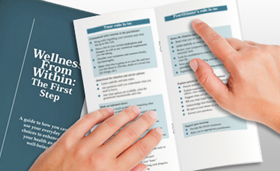Search Results
Frequently Asked Questions About Eating For Health

Judy E. Buss
Q. Is it difficult to switch from a poor diet to a healthy one?
A. Armed with reasons to improve your diet, you will be more successful if you do not attempt to implement an overnight Bolshevik Revolution. Gradually oust the bad and the ugly and phase-in nutritious, health-boosting fare. Eat smaller portions (using smaller plates and bowls), and progressively eliminate frequent junk nibbling, replacing them with one nutritious snack between meals.
Q. Is cooking healthy more time consuming?
A. Absolutely not! Literally hundreds of delicious dishes can be made with little time investment. Quality-oriented food preparation also takes less time than doctor visits, medical tests and hospital stays, and is more pleasant and rewarding.
Q. Is a healthy diet more expensive?
A. If every American followed a nutritious diet, then our personal and national expenditures on health care would plummet in short order! Scrumptious cuisine can be easily cooked with inexpensive, readily available ingredients. The secret is eating lean, and whole, unprocessed, natural food.
Q. I work full-time. How can I eat healthy when I am not at home all day?
A. Planning is the key, just as we do for everything else we wish to accomplish. Eat a nutritious breakfast before you leave home. Keep your kitchen stocked with wholesome ingredients. Prepare nutritious sandwiches, low fat plain yogurt (add nuts, fruit or dried fruit if desired), or take some home-cooked leftover food to work. Pack some cut-up fresh vegetables, whole grain pita bread and hummus, etc. Most work places offer the use of a refrigerator and microwave to employees, or you can bring a small cooler or a bag with ice packs. Figuring out a system takes little effort and is truly a piece of cake… Some food can be cooked or baked in advance during weekends.
Q. What is the best cooking method for vegetables?
A. Vegetables contain numerous potent, disease-fighting compounds. Fresh produce, eaten raw where appropriate) or briefly steamed, deliver the most benefits. Frozen veggies cannot rival fresh ones since processing and freezing causes them to lose some of their nutritional value. Additionally, because in a frozen state they have a long shelf life, you may be eating frozen peas from Methuselah’s time…This does not spell F-R-E-S-H. Canned vegetables are overcooked and rife with artificial chemicals. They are dead on arrival. Produce cooked immersed in water is almost entirely useless as well. During the cooking process nutrients are leached into the water which is then usually discarded. The exception is when making a soup or a stew, because the nutrition-laden liquid is consumed as well.
Q. What is the difference between whole and processed grains?
A. Whole grains are packed with numerous health-promoting substances, including vitamins, minerals, protein, and fiber. In addition, they produce sustained, long-lasting release of energy, preventing frequent bouts of hunger and drastic fluctuations of blood glucose. Their processed counterparts are nutritionally deficient, because parts of the grain kernel have been removed. In many cases what is left is also bleached and further processed. The end result is a nutritionally poor product to which no amount of “fortification” can restore what was lost. Processed grains are digested much faster than whole grains leading to blood glucose spikes and drops that are detrimental to health.
Q. Which beverages are best suited for a healthy diet?
A. Without question plain water, preferably purified, should be your chief means of hydration. The human body consists of 65 percent water and requires 6-8 glasses of the liquid per day for peak performance. Other beverages, consumed in moderation, can be green tea, all natural home-cooked herbal teas (hot or cold), 100 percent pure fruit juices, low fat or skim milk. All types of soda and most other commercial drinks should be left at the store… Do not however, drink more than one half cup of liquid with meals, for it dilutes your digestive juices and prevents proper digestion and nutrient absorption.
Q. In a nutshell, what constitutes a healthy diet?
A. A healthy diet consists of whole grains, legumes (beans, peas and lentils), fresh vegetables eaten raw or briefly steamed. Nuts and fruits should be consumed in moderation. Eat small portions of poultry and fish and little or no red meat. Cook exclusively with olive or canola oil, limit eggs to 3 – 4 per week, and drink 6-8 glasses of water between meals. Eliminate sodas, white sugar, artificial sweeteners and additives. Shun white flour, fried food, full-fat dairy, and snacking on junk food. An all-natural, lean diet of fresh, unprocessed ingredients, is key to wellness.
“Mission Nutrition” Tips and Recipes from Judy E. Buss, Syndicated Eating-for-Health Columnist
Stay tuned for more Judy E. Buss’ “Mission Nutrition” words of wisdom and recipes.




















